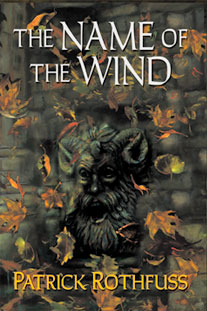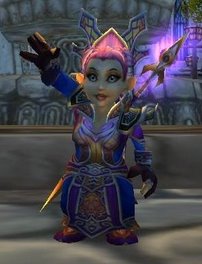 A month or two ago, my friend K. recommended a book to me called The Name of the Wind by a newly published author named Patrick Rothfuss. She lent me a copy of the book, and I then proceeded to read it cover to cover in the next 48 hours. It's a 662 page book.
A month or two ago, my friend K. recommended a book to me called The Name of the Wind by a newly published author named Patrick Rothfuss. She lent me a copy of the book, and I then proceeded to read it cover to cover in the next 48 hours. It's a 662 page book.In short, I loved it. And for a while, I've been trying to figure out why I liked it so much, as well as what made it original.
Because on the surface, it doesn't seem particularly original. It's the first of a trilogy (Tolkien and others), the protagonist--Kvothe--heads off to a university to learn magic that involves knowing the true names of things (Le Guin), and Kvothe has awesome abilities that set him apart from the other students at the school (Rowling, Pullman, Nix, too many to name).
Yes, many of these things are what fantasy fans love to read about, but this book is much more creative than genre fantasy. Rothfuss doesn't just recycle plot devices and stock imagery. He changes it, makes it his own, and adds humanity to it.
That's where I think Rothfuss's real strength lies. His hero, Kvothe, is a hero who more than anything, is human. He makes mistakes. He does really stupid stuff. And he gets punished for doing that stupid stuff. Also, when we first meet him, he is a broken older man, who is living in a small town barely making a living as an innkeeper. When the innkeeper tells us his story, and how he started out as this extremely gifted boy, it's hard to believe that such a hero could end up as he is now. In short, Kvothe isn't the perfect wizard who always knows what to do and always comes through for those who need him. He's a human who makes mistakes, who also happens to have magical powers.
This is what sets Rothfuss apart from other fantasy authors. Take Lord of the Rings, for example. Gandalf makes a mistake...sort of...by leading the fellowship through the Mines of Moria. But it wasn't because of a character flaw on his part; he didn't do it because he was selfish or jealous. He did it because he thought it was the only way, and simply didn't know any better.
 Harry Potter is another good example of why Rothfuss' novel stands out. Rowling has done great things with Harry, particularly in books 5 and 6 where she shows how Harry can be petulant, self-involved, and whiny. She has done a good job of making Harry a real kid first, and a super wizard second. But the problem with Harry, particularly within Hogwarts, is that he rarely gets into any sort of lasting trouble. Fly a magic car to school? No problem! Use a potentially fatal spell against a classmate? He'll get over it. Take a particularly nasty teacher out to the Forbidden Forest to be stampeded by centaurs? Well, she didn't die, did she? In book after book, Harry, Ron, and Hermione break rule upon rule, and they always get away with it. The worst that's ever happened to Harry (within the realm of Hogwarts) is that he had to miss the Quidditch championships, but expelling him or inflicting a more lasting punishment on him seems out of the question. Yes, things outside of Hogwarts have happened when Harry has broken the rules (the end of book 5 is particularly notable), but within Hogwarts, Harry is the golden boy who can do no wrong.
Harry Potter is another good example of why Rothfuss' novel stands out. Rowling has done great things with Harry, particularly in books 5 and 6 where she shows how Harry can be petulant, self-involved, and whiny. She has done a good job of making Harry a real kid first, and a super wizard second. But the problem with Harry, particularly within Hogwarts, is that he rarely gets into any sort of lasting trouble. Fly a magic car to school? No problem! Use a potentially fatal spell against a classmate? He'll get over it. Take a particularly nasty teacher out to the Forbidden Forest to be stampeded by centaurs? Well, she didn't die, did she? In book after book, Harry, Ron, and Hermione break rule upon rule, and they always get away with it. The worst that's ever happened to Harry (within the realm of Hogwarts) is that he had to miss the Quidditch championships, but expelling him or inflicting a more lasting punishment on him seems out of the question. Yes, things outside of Hogwarts have happened when Harry has broken the rules (the end of book 5 is particularly notable), but within Hogwarts, Harry is the golden boy who can do no wrong.Kvothe gets no such breaks. A mistake at the beginning of his term at the university--one that he was directly responsible for because of his impatience and need for revenge--has long-lasting consequences that really impede his development as a wizard. He's always in need of money, unlike Harry who has all the gold he could ever want in the bank. And his desire to show off and be the best always seems to get him into trouble. He's irritating at times, enough that you want to smack him on the head and say, "What were you thinking?"
But the other thing that Rothfuss does extremely well is tell the story through Kvothe's eyes, and as a result, all his choices and decisions seem perfectly logical. And so instead of sitting off to the side, chastising Kvothe in advance for his bad choices, you are right there with him, agreeing that whatever it is he's doing is the only possible thing under the circumstances. Only later do you want to ask, "What were you thinking?" but by then it's too late, because you and he together have already made the choice that caused so much trouble.
Many fantasy authors, it seems, think that by including dragons, wizards, and magic, they can cover up a host of other faults, particularly lack of character development and an uninteresting plot. Rothfuss has no such illusions. For The Name of the Wind, the characters and the plot are what make the book great and extremely original; the magical elements are the subtle seasoning that adds the perfect finishing touches to the novel.

No comments:
Post a Comment